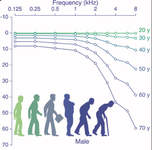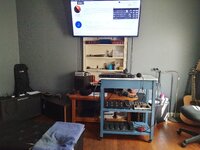I've made some progress, and the main stumbling block was a filter that could slice off at a certain point and not gently roll off like a normal variable Q filter. I didn't find anything in Cubase but I did in Audition - an FFT filter with lots of cut at an exact frequency and above. I've created a clip from an existing pice that has lots of top end from cymbals and harmonics from an organ sound - it was tricky, because I can't actually hear what I can see, but I checked on my phone app and it could hear what I can't.
The results will be interesting I think. Because most filters on screen are displayed logarithmically, the important area is squashed, so in audition, I displayed it as linear. I looped the section of the track, and at each loop, changed the cutoff. I started really low, and was surprised how while 'dull' - even a splash cymbal was still a splash, then I went up in 2K increments right up to 20K. I could hear a difference between cutoff at 12K and 14K, but above that, I could see the extra segments coming to life but not detect anthing. I'm really interested to hear the comments from younger less limited folk. I'm already realising that once your age (or damage) prevents you hearing differences it's very tricky to imagine what is missing. I figured I could easily 'guess' the missing stuff and estimate how much extra top end to add, EQ wise, by watching the EQ in the display as i turn it up, but I'm not certain I can - I think maybe EQ'ing what I can hear, and not see might be best. I really don't know. Hopefully I will get it edited tomorrow and then you can all listen. I wonder if it might also reveal if YouTube are limiting Frequency response in their compression algorithm? Need younger ears with opinions. I'm quite excited by this, as I think we've all been guilty of assuming hearing loss from age or injury is easy to deal with and easy to correct?





